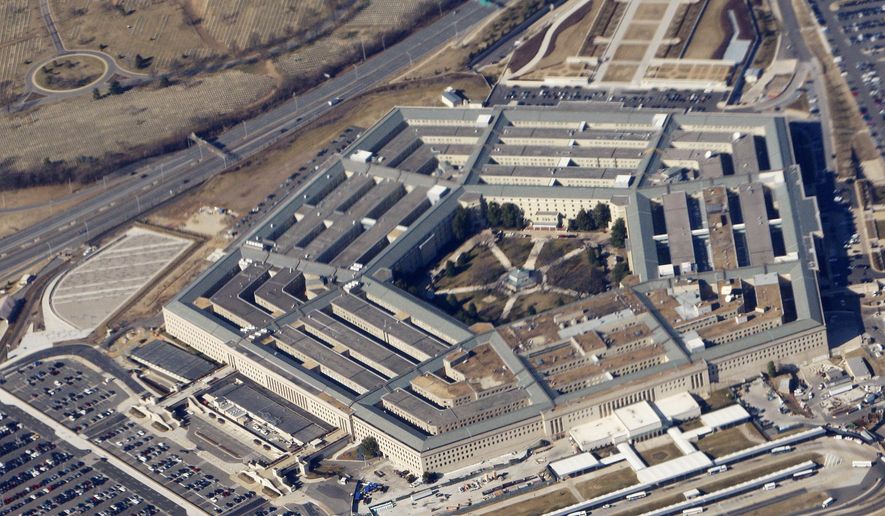Recent gains by U.S. and Afghan forces under the Trump administration’s South Asia strategy could be in jeopardy if Washington presses ahead with plans to slash the number of American troops in Afghanistan by half, says a Pentagon assessment of the 17-year-old conflict.
In an annual assessment of the Afghan war, Defense Department analysts suggest that any let up in pressure against the Taliban could derail efforts to secure peace talks with the insurgent group.
“The reinforcement and realignment of U.S. and coalition forces and authorities under the South Asia Strategy have significantly increased pressure on the Taliban,” defense officials wrote in the report and submitted to Congress on Thursday.
President Trump’s decision last year to send an additional 3,000 U.S. troops into Afghanistan as part of his South Asia strategy “stabilized the situation in Afghanistan, slowing the momentum of a Taliban march that had capitalized on U.S. drawdowns between 2011 and 2016,” the analysts wrote, adding that “the key to success remains sustained military pressure against the Taliban” by Afghan forces backed by the nearly 14,000 U.S. services members still in country.
“Convincing the Taliban that they cannot win on the battlefield, and credibly committing to a conditions based strategy” under the South Asia plan, Kabul and Washington “have greatly increased the odds of concluding a settlement” to bring America’s longest war to an end, they said.
But Mr. Trump is seemingly abandoning that conditions-based strategy in Afghanistan, having order the Pentagon to begin planning for a withdrawal of 7,000 troops.
The president reportedly decided to reduce troop levels in Afghanistan at the same time White House officials opted to pull out all 2,000 U.S. service members assisting local forces battling the Islamic State in Syria.
The Wall Street Journal first reported details of the Trump administration’s request for an Afghanistan withdrawal on Thursday, the same day as the Pentagon’s latest review of the Afghan war effort was delivered to Capitol Hill. The review’s findings, coupled with the White House’s decision to begin drawing down in Afghanistan, drew condemnation from congressional lawmakers.
House Armed Services Committee Chairman Mac Thornberry said he was “deeply disturbed” by reports of a major drawdown of U.S. forces from Afghanistan. The decision will put the remaining U.S. forces in the country at greater risk, while “reliving pressure on the Taliban at a critical juncture in peace negotiations,” the Texas Republican said Friday in a statement.
Seeking peaceful reconciliation with the Taliban as a main goal in the South Asia strategy has been seen as a distinct break from previous administrations’ efforts to end the war.
U.S. Special Envoy to Afghanistan Zalmay Khalilzad met last Monday with top Taliban officials to discuss peace talks. His meeting in Abu Dhabi was the third time he has sat down with the terrorist group’s leaders since being appointed as special envoy.
“Considerable progress has been made in the last two years against terrorist organizations in a variety of places around the world,” Mr. Thornberry said. “Reducing the American presence in Afghanistan and removing our presence in Syria will reverse that progress, encourage our adversaries, and make America less safe.”
Taliban leaders have begun heralding Mr. Trump’s decision on Afghanistan, saying it marks the group’s victory over the U.S.
“The 17-year-long struggle and sacrifices of thousands of our people finally yielded fruit,” a senior Taliban commander in Helmand Province told NBC News. “We proved it to the entire world that we defeated the self-proclaimed world’s lone super power.”
Sen. Lindsey Graham, South Carolina Republican, offered a more blunt assessment of the effects a U.S. troop withdrawal would have in Afghanistan.
“The bad news is if we leave Afghanistan [now] the place will go to [excrement] in a year,” the Senate Armed Services Committee member told CNN during a recent visit to the country.
That scenario “would make Iraq look like a walk in the park,” Mr. Graham said, referring to the 2011 U.S. withdrawal that set the stage for the rise of the Islamic State in the Middle East.
• Carlo Muñoz can be reached at cmunoz@washingtontimes.com.




Please read our comment policy before commenting.